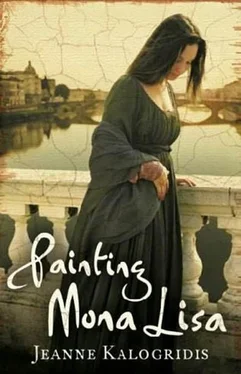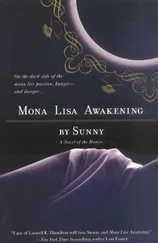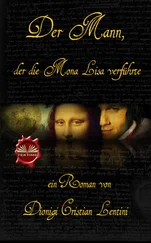“He is not there,” a muffled voice replied. Thinking it meant his brother had moved south to find him, Lorenzo turned back in that direction, where his friends still fought the assassins. The smaller priest with the shield had fled altogether, but the madman remained, though he was losing the battle with Marco. Giuliano was nowhere to be seen.
Discouraged, Lorenzo began to turn away, but the glint of swift-moving steel caught his eye and compelled him to look back.
The blade belonged to Bernardo Baroncelli. With a viciousness Lorenzo would never have dreamed him capable of, Baroncelli ran his long knife deep into the pit of Francesco Nori’s stomach. Nori’s eyes bulged as he stared down at the intrusion; his lips formed a small, perfect O as he fell backward, sliding off Baroncelli’s sword.
Lorenzo let go a sob. Poliziano and della Stuffa took his shoulders and pushed him away, across the altar and toward the tall doors of the sacristy. “Get Francesco!” he begged them. “Someone bring Francesco. He is still alive; I know it!”
He tried again to turn, to call out for his brother, but this time his people would not let him slow their relentless march to the sacristy. Lorenzo felt a physical pain in his chest, a pressure so brutal he thought his heart would burst.
He had wounded Giuliano. He had hurt him in his most vulnerable moment, and when Giuliano had said, I love you, Lorenzo… Please don’t make me choose , Lorenzo had been cruel. Had turned him away, without help-the one thing he owed Giuliano most of all.
How could he explain to the others that he could never leave his younger brother behind? How could he explain the responsibility he felt for Giuliano, who had lost his father so young and had always looked to Lorenzo for guidance? How could he explain the promise he had made to his father on the latter’s deathbed? They were all too concerned with the safety of Lorenzo il Magnifico , whom they considered to be the greatest man in Florence, but they were wrong, all of them.
Lorenzo was pushed behind the thick, heavy doors of the sacristy. They slammed shut after someone ventured out to fetch the wounded Nori.
Inside, the airless, windowless chamber smelled of sacrificial wine and the dust that had settled on the priests’ vestments. Lorenzo grabbed each man who had pushed him to safety; he studied each face, and was each time disappointed. The greatest man in Florence was not here.
He thought of Baroncelli’s great curving knife and of the bright blood on Francesco de’ Pazzi’s thigh and tunic. The images propelled him to move for the doors, with the intention of flinging them open and going back to rescue his brother. But della Stuffa sensed his intention, and immediately pressed his body against the exit. Old Michelozzo joined him, then Antonio Ridolfo; the weight of the three men held the doors shut fast. Lorenzo was pushed to the outer edge of the engraved brass. There was a grimness in their expressions, an unspoken, unspeakable knowledge that Lorenzo could not and would not accept.
Hysterically, he pounded on the cold brass until his fists ached-and then he continued to pound until they bled. The scholar Angelo Poliziano struggled to wrap a piece of wool, torn from his own mantle, around the bleeding cut on Lorenzo’s neck. Lorenzo tried to push the distraction away, but Poliziano persisted until the wound was bound tight.
All the while, Lorenzo did not cease his frantic efforts. “My brother!” he cried shrilly, and would not be moved by those who came to comfort him, would not be stilled or quieted. “I must go and find him! My brother! Where is my brother?…”
…
Moments earlier, Giuliano had looked up in amazement as Baroncelli lifted his great knife overhead-the tip of the blade pointed directly at the younger Medici brother’s heart.
It happened too quickly for Giuliano to be frightened. Instinctively, he backed away-into a body that pressed against him, so firm and so fast, there could be no doubt its owner was part of the conspiracy. Giuliano glimpsed the man behind him, dressed in the robes of a penitent-and then gasped at the cold, burning sensation of steel sliding into his back, just below his ribs.
He had been terribly wounded. He was surrounded by assassins, and about to die.
The realizations did not distress him as much as the fact that he was trapped and unable to warn Lorenzo. Surely his brother would be the next target.
“Lorenzo,” he said emphatically, as Baroncelli’s knife at last came flashing down, the blade reflecting a hundred tiny flames from the candles on the altar. But his utterance was drowned out by Baroncelli’s panicked, nonsensical cry: “Here, traitor!”
The blow caught Giuliano between his uppermost pair of ribs. There came the dull crack of bone, and a second spasm of pain so intense, so impossible, it left him breathless.
Baroncelli’s clean-shaven face, so close to Giuliano’s own, gleamed with sweat. He grunted with effort as he withdrew the knife; it came out whistling. Giuliano fought to draw another breath, to call out Lorenzo’s name again; it came out less audible than a whisper.
And in that instant, as he stared up at the knife, as Baroncelli prepared to deliver another blow, Giuliano was transported to another place, another time: to the river Arno, on a long-ago day in late spring.
He called out for his brother, but no answer came; Lorenzo had disappeared beneath the cloudy water. Giuliano’s eyes stung. He could not find his strength or his breath, but he knew what he must do.
Dear God , he prayed, with the sincerity of a child. Let me rescue my brother .
With strength he did not have, he pushed backward against the penitent, causing the man to step back onto the hem of his garment and fall, tangled in his robes.
Giuliano was free to flee, to stagger away from his attackers-but he knew that their main target must be Lorenzo.
Time slowed, just as it did that day in the Arno. Despite his lethargy, Giuliano willed himself to do the impossible and create a barrier between the attackers and Lorenzo. If he could not cry out a warning to his brother, he could at least slow the murderers down.
He heard his brother’s voice. Giuliano! Brother, speak to me!
He could not have said whether it came from within the Duomo, or whether it was an echo from childhood, the voice of an eleven-year-old boy calling from the banks of a river. He wanted to tell his brother to run, but he could not speak. He struggled to draw in a breath, and choked on warm liquid.
Baroncelli tried to edge by him, but Giuliano wobbled intentionally into his path. Francesco de’ Pazzi pushed past his co-conspirator. The sight of blood had stirred him to frenzy; his small black eyes sparkled; his wiry body shook with hatred. Raising his dagger-a long blade, almost as slender and keen as a stiletto-he, too, tried to move beyond Baroncelli’s victim, but Giuliano would not let him pass.
Giuliano opened his mouth. What came out was an anguished wheeze, but he meant to shout, You will never get near my brother. I will die first, but you will never lay a hand on Lorenzo .
Francesco snarled something unintelligible and struck. Weaponless, Giuliano raised a defensive hand; the knife pierced his palm and forearm. Compared to the agony in his chest and back, these fresh wounds were no worse than the sting of an insect. Taking a step toward Francesco, toward Baroncelli, he forced them backward, giving Lorenzo time to flee.
Francesco, vicious little man, let loose a torrent of all the rage, all the enmity, that his family had felt toward the Medici. Each phrase was punctuated by a further blow of the dagger.
Sons of whores, all of you! Your father betrayed my father’s trust …
Читать дальше
Конец ознакомительного отрывка
Купить книгу












